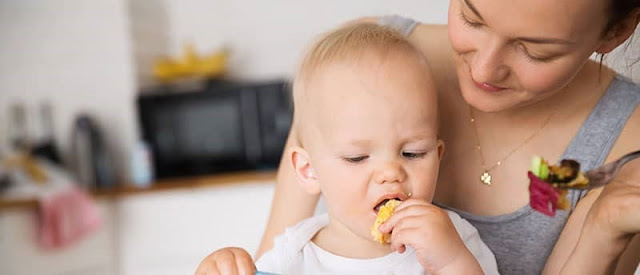Baby-led Weaning Poses No Risk of Choking
 |
Babies Love to Explore Different Tastes & Textures
|
WHO recommends exclusively breastfeeding a baby up to 6
months after he/she is born. But, not all parents follow this practice
diligently and some even start their infants on solid foods right from 4
months. What happens when infants are fed solids at such a young age? Do they
choke?
The study found no crucial difference when mothers let their
babies feed themselves, tried a combination of spoon feeding and allowing the
infant to feed on finger foods or when they completely spoon-fed their infants.
Earlier, babies were started on mashed/pureed foods that are
easy on the baby. But now, more and more parents follow a baby-led weaning
approach where the infant is let loose to self-feed on family foods instead of
spoon feeding mashed/pureed foods. This also proves that babies don’t choke
when started on solid foods right from a very young age. But still, some people
keep complaining that self-feeding might result in the infant consuming less
than the usual quantity consumed. This is not true, as the amount of energy
needed from food is only a small quantity (250 calories daily) until the baby’s
9 month.
No right or wrong way exists in introducing babies to solid
foods. The only concern here is to introduce your child to different tastes and
textures allowing the little one to eat at his/her own pace. Many parents are now
following the baby-led weaning approach as it comes with a host of advantages:
it helps parents to dine along with the child, prevents the need to cook any
special foods for the infant and helps the baby get accustomed to a variety of
foods right from a young age allowing them to enjoy what he/she eats.
Introducing your child to solid foods for the first time is an overwhelming
experience for the entire family. Tips to handle babies on their first
solid-food experience are available at www.firsteatright.com.
The researchers also believe that baby-led weaning does not
propose any choking hazards until foods that are said to be of choking risk to
children are avoided. Still, parents should be cautious and plan foods that can
be easily given to babies, be smart about the size and shape of foods they
offer to infants and visit their pediatrician to clarify any doubts lurking in
the mind. It is better to avoid whole nuts until the baby’s fifth birthday, prevent
infants from eating raw foods that can chop into small pieces once they bite
(raw apple slices or small carrot cubes) and also avoid feeding them gelatinous
foods like sausage, raw jelly cubes or sticky sweets.
The study showed a small percentage of risk associated with
very sticky foods such as thick chunks of bread that might get stuck midway in
the throat or large chunks of slippery foods that might be entirely swallowed
by mistake, such as very ripe banana, hard chunks of melon and avocado.
Whatever might be the food given to the baby, it is necessary that either of
the parent/caretaker stays with the child until he/she finishes the food.


Comments
Post a Comment